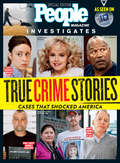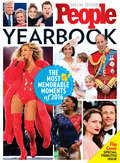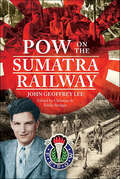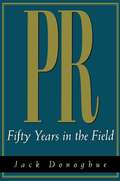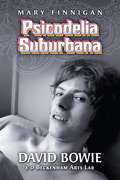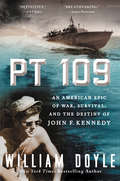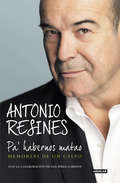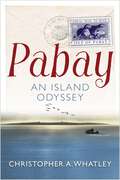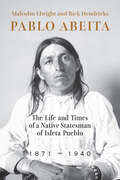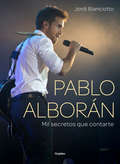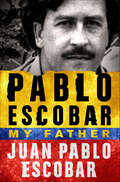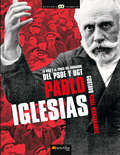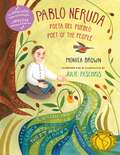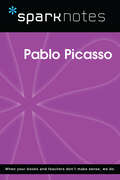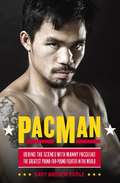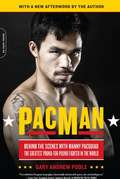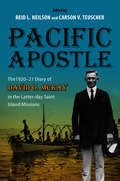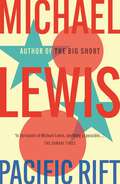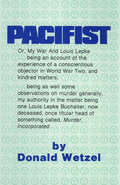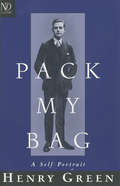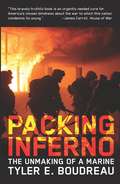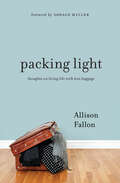- Table View
- List View
PEOPLE True Crimes: Cases That Shocked America (People Ser.)
by PeopleFresh twists on notorious trials are the focus of True Crime Stories: Cases That Shocked America, a special edition of PEOPLE magazine. A companion to the new Investigation Discovery network series People Magazine Investigates, this edition explores crimes that have remained a mystery for years, the 1996 murder of toddler pageant contestant JonBenet Ramsey, the disappearance of little Lisa Irwin from her Kansas home in 2011, and reports on the latest efforts to solve them. Also featured are the reasons behind new murder trials awaiting Robert Durst, the millionaire profiled on the HBO mini-series The Jinx, and Adnan Syed, the subject of the podcast Serial. ItÍs a new look at more than 25 crimes, and the people who have overcome unthinkable tragedies to help their communities in the name of lost loved ones.
PEOPLE Yearbook: The Most Memorable Moments of 2016 & Those We Lost in 2016
by The Editors of PEOPLEPeople highlights the memorable and significant moments of 2016 and profiles those we lost this year.
POW on the Sumatra Railway
by Christine BridgesJohn Geoffrey Lee (always known as Geoff) joined the RAF on his 20th birthday in June 1941. He left Liverpool on a troop ship in December 1941, with no idea where he was going. He eventually arrived in Java, where he was captured by the Japanese, along with many others. During his time in captivity, he survived several camps in Java, Ambon and Singapore and three hell ship journeys. After being washed ashore in Sumatra, (as a ferry he was being transported on blew up), he was then recaptured and suffered sheer hell as a slave on the Sumatra Railway. Enduring bouts of malaria, beri beri, tropical ulcers and a starvation diet was bad enough, but this was exacerbated by the searing heat and extreme cruelty meted out to the prisoners by the Japanese and Korean guards. Geoff miraculously survived, weighing just 6 stone when he arrived back in Liverpool in December 1945. After his release he found he had difficulty in convincing people where he had been as no one had heard of the “Sumatra Railway”, only the other one, thousands of miles away in Burma. Letters to newspapers were returned as ‘Just another Burma Railway story’. The Ministry of Defence, Commonwealth War Graves Commission, and The Imperial War Museum had no records of POW’s building a railway in Sumatra. So began Geoff’s journey, his aim… to prove to the establishment what he already knew to be true. This is Geoff's story of his captivity, release, and subsequent efforts in achieving his aim.
PR: Fifty Years in the Field
by Jack DonoghueIn PR: Fifty Years in the Field, Jack Donoghue brings together the results of a lifetime in public relations — in the military, public, and private sectors. Each chapter focuses on a different public relations problem, so that the collection as a whole reflects the full spectrum of challenges that PR officers face. The book documents the strategies applied to and the lessons learned from public relations exercises involving such divergent events as the Hong Kong Courts Martial, the Manitoba flood of 1950, the Manitoba polio epidemic of 1953, and the National Energy Program. It also describes the PR problems presented by the Alberta nurses’ strike of 1977 and the fiasco of Information Canada. Jack Donoghue’s memoirs provide a different and instructive view on significant events in Canada’s history.
PSICODELIA SUBURBANA - David Bowie e o Beckenham Arts Lab
by Alessandra Lobo Mary FinniganEste livro não é sobre as músicas do David Bowie. Existem vários livros já escritos sobre isso. É um livro sobre uma fatia única da história, sobre quando os jovens ao Sul de Londres se uniram para uma experiência mágica cujo auge se deu na tarde de 16 de agosto. Posso escrever uma prosa razoável, mas não sou nenhuma poeta genial ou musicista. David Bowie era desde calibre. As palavras em sua canção "Memory of a Free Festival" e a melodia que segue com ela reflete bem melhor toda a atmosfera daquele dia do que qualquer tentativa que eu faça.
PT 109: An American Epic of War, Survival, and the Destiny of John F. Kennedy
by William DoyleNew York Times bestselling author William Doyle’s PT 109 is the World War II story of shipwreck and survival that paved John F. Kennedy’s path to power.In the early morning of August 2, 1943, during a nighttime skirmish amid the Solomon Islands, the Japanese destroyer Amagiri barreled through thick fog and struck the U.S. Navy’s motor torpedo boat PT 109, splitting the craft nearly in half and killing two American sailors instantly. The sea erupted in flames as the 109’s skipper, John F. Kennedy, and the ten surviving crewmen desperately clung to the sinking wreckage; 1,200 feet of ink-black, shark-infested water loomed beneath. Informed that all hands were lost, the American base attempted no rescue. What follows is one of the most remarkable tales of World War II, one whose astonishing afterlife would culminate two decades later in the White House.Drawing on original interviews with the last living links to the events, previously untapped Japanese wartime archives, and a wealth of archival documents from the Kennedy Library, including a lost first-hand account by JFK himself, William Doyle has crafted a thrilling and definitive account of the sinking of PT 109 and its shipwrecked crew’s heroics. Equally fascinating is the story’s second act, in which Doyle explores how this extraordinary episode shaped Kennedy’s character and fate, proving instrumental to achieving his presidential ambitions.Featuring castaways on a deserted island, a spy network of Solomon Island natives, an Australian coast watcher hidden on the side of a volcano, an S.O.S. note carved into a coconut, and a daring rescue attempt, PT 109 is an unforgettable American epic of war and destiny.
Pa' habernos matao
by Antonio ResinesUn hermoso y entretenido recorrido por la vida de Antonio Resines, por sus películas y por la historia reciente de España. Antonio Resines, después de haber aprobado el Curso Preuniversitario que a finales de los setenta era conocido vulgarmente como «Preu», empezó en Madrid sus estudios universitarios, primero en Derecho y luego en Periodismo. Fue en esta época cuando, por casualidad, comenzó a actuar. Nada presagiaba entonces que llegaría a ser uno de los actores más reconocidos de su generación, a obtener distinciones tan importantes como el Goya al mejor actor y a convertirse en presidente de la Academia de las Artes y las Ciencias Cinematográficas de España. En Pa' habernos matao el famoso actor rememora su vida y sus películas, al tiempo que hace un ameno y entrañable recorrido por la historia reciente de nuestro país. Un libro lleno de anécdotas -algunas divertidas, otras cáusticas y otras muy reveladoras- por cuyas páginas desfilan un nutrido elenco de personajes -Fernando Trueba, José Luis Cuerda, Jorge Sanz, Fernando Colomo, entre otros- y momentos clave de las últimas décadas. Descubriremos también a un hombre bueno, con un gran sentido del humor y que disfruta de la compañía de sus amigos. La crítica ha dicho...«Una verdadera delicia, sin excepciones.»El correo Gallego «Pa' habernos matao es un libro precioso. Las memorias de un actor único, Antonio Resines.»El correo Gallego
Paarvaiyatra Mudhal Pattadhari Penn Helen Keller
by Yercaud ElangoHelen Keller is an example for self-confidence and perseverance. For her hard work, social service, education and equal rights, the world feted her. For the achievements of serving people by breaking the barriers by this Blind, deaf woman, people praised her as Wonder Woman. This book describes the wonderful lifetime achievements of this blind, deaf woman and by reading this book, the readers will get impulse to strive for the cause of social progress.
Pabay: An Island Odyssey
by Christopher Whatley&“An island history almost without comparison . . . one of the finest Highland books of the 21st century&” from the renowned Scottish historian (West Highland Free Press). The tiny diamond-shaped island of Pabay lies in Skye&’s Inner Sound, just two and a half miles from the bustling village of Broadford. One of five Hebridean islands of that name, it derives from the Norse papa-ey, meaning &“island of the priest.&” Many visitors since the first holy men built their chapel there have felt that Pabay is a deeply spiritual place, and one of wonder. These include the great 19th-century geologists Hugh Miller and Archibald Geikie, for whom the island&’s rocks and fossil-laden shales revealed much about the nature of Creation itself. Len and Margaret Whatley moved to Pabay from the Midlands and lived there from 1950 until 1970. Leaving a landlocked life in Birmingham for the emptiness of an uninhabited island was a brave and challenging move for which nothing could have prepared them. Christopher Whatley, their nephew, was a regular visitor to Pabay whilst they lived there. In this book, based on archival research, oral interviews, memory and personal experience, he explores the history of this tiny island jewel, and the people for whom it has been home, to create a vivid picture of the trials, tribulations and joys of island life.&“If the island itself is a diamond, this work is a sparkling gem.&” —The Press and Journal&“Beautifully written, and presents a richly detailed and fascinating historical narrative . . . It&’s as much a testimony to how people have shaped the island and how the island has shaped them.&” —Dundee Courier
Pablo Abeita: The Life and Times of a Native Statesman of Isleta Pueblo, 1871–1940
by Rick Hendricks Malcolm EbrightPablo Abeita is the first biography of Pablo Abeita, a man considered the most important Native leader in the Southwest in his day. Abeita was a strong advocate for Isleta and the other eighteen New Mexico pueblos during the periods of assimilation, boarding schools, and the reform of US Indian policy. Working with some of the most progressive Indian agents in New Mexico, with other Pueblo leaders, and with advocacy groups, he received funding for much-needed projects, such as a bridge across the Rio Grande at Isleta. To achieve these ends, Abeita testified before Congress and was said to have met, and in some cases befriended, nearly every US president from Benjamin Harrison to Franklin D. Roosevelt.Abeita dealt with many issues that are still relevant today, including reform of US Indian policy, boarding schools, and Pueblo sovereignty. Pablo Abeita&’s story is one of a people still living on their ancestral homelands, struggling to protect their land and water, and ultimately thriving as a modern pueblo.
Pablo Alborán: Mil secretos que contarte
by Jordi BianciottoPablo Alborán se ha convertido en un hito en la historia de la música española del siglo XXI, a pesar de su todavía breve trayectoria artística. En sólo dos años y con tres álbumes publicados, ha conseguido un impacto popular inaudito, con unas canciones que han llegado al corazón de millones de personas en España, Portugal y Latinoamérica. Sin embargo, los éxitos y los récords batidos, no han cambiado su actitud: Pablo Alborán mantiene los pies en la tierra, la sencillez de carácter y la cercanía a sus fans, consciente de que sin ellos nada hubiera sido posible.Este libro recoge las claves su éxito abrumador: desde sus raíces y su pasión por la música hasta su consagración como fenómeno de ventas discográficas con sólo 24 años, pasando por su especial vínculo con la familia y su intensa y cercana relación con los fans, incluyendo además información inédita sobre los proyectos y perspectivas de futuro de un artista que podría convertirse en poco tiempo en la nueva estrella global de la música española.
Pablo Escobar: My Father
by Juan Pablo EscobarTHE POPULAR SERIES NARCOS CAPTURES ONLY HALF THE TRUTH. HERE, AT LAST, IS THE FULL STORY.THE INTERNATIONAL BEST SELLER!Until now, we believed that everything had been said about the rise and fall of Pablo Escobar, the most infamous drug kingpin of all time, but these versions have always been told from the outside, never from the intimacy of his own home.More than two decades after the full-fledged manhunt finally caught up with the king of cocaine, Juan Pablo Escobar travels to the past to reveal an unabridged version of his father—a man capable of committing the most extreme acts of cruelty while simultaneously professing infinite love for his family.This is not the story of a child seeking redemption for his father, but a shocking look at the consequences of violence and the overwhelming need for peace and forgiveness.
Pablo Iglesias (Historia Incógnita)
by Gustavo Vidal ManzanaresEste libro cuenta las facetas menos conocidas de Pablo Iglesias Posse: su niñez marcada por la pobreza en la que tenía que abrigarse con papeles bajo su vieja chaqueta, la muerte de su hermano por tuberculosis o cuando contemplaba a su madre pedir limosna… También se relata su juventud, su desarrollo y crecimiento intelectual y, por su puesto, toda su etapa adulta dura, difícil, cargada de detenciones, procesos, cárcel y hambre…
Pablo Neruda: Poet of the People
by Monica BrownOnce there was a little boy named Neftalí who loved wild things wildly and quiet things quietly. From the moment he could talk, he surrounded himself with words. Neftalí discovered the magic between the pages of books. When he was sixteen, he began publishing his poems as Pablo Neruda. Pablo wrote poems about the things he loved―things made by his friends in the café, things found at the marketplace, and things he saw in nature. He wrote about the people of Chile and their stories of struggle. Because above all things and above all words, Pablo Neruda loved people.
Pablo Neruda: Poet of the People / Poeta del pueblo (Bilingual Edition)
by Monica BrownA new Spanish and English bilingual edition of the stunning picture book biography of Pablo Neruda, one of the world's most enduring and popular poets, from the acclaimed Monica Brown.Había una vez un niño llamado Neftalí, quien amaba las cosas salvajes locamente y las cosas tranquilas serenamente. Desde el momento en que aprendió a hablar, se rodeó de palabras. Neftalí descubrió la magia oculta entre las páginas de los libros.Cuando tenía dieciséis años, comenzó a publicar sus poemas bajo el nombre Pablo Neruda. Pablo escribió poemas sobre las cosas que amaba: obras creadas por sus amigos artistas, objetos hallados en los mercados y elementos de la naturaleza. Escribió sobre la gente de Chile y su lucha por salir adelante. Porque sobre todas las cosas y sobre todas las palabras, Pablo Neruda amaba a la gente.Once there was a little boy named Neftalí who loved wild things wildly and quiet things quietly. From the moment he could talk, he surrounded himself with words, seeking comfort and inspiration from the magic he discovered between the pages of books.When he was sixteen, he began publishing his writing as Pablo Neruda. Pablo wrote poems about the things he loved—things made by his friends in the café, things found at the marketplace, and things he saw in nature. He wrote about the people of Chile and their stories of struggle. Because above all things and above all words, Pablo Neruda loved people.With a new translation of Monica Brown's lyrical text and Julia Paschkis' gorgeous art, which celebrates multiple languages, this new edition will introduce the youngest of readers—of English, Spanish, and both—to the legacy of one of history's most iconic talents.
Pablo Picasso (SparkNotes Biography Guide)
by SparkNotesPablo Picasso (SparkNotes Biography Guide) Making the reading experience fun! SparkNotes Biography Guides examine the lives of historical luminaries, from Alexander the Great to Virginia Woolf. Each biography guide includes:An examination of the historical context in which the person lived A summary of the person&’s life and achievements A glossary of important terms, people, and events An in-depth look at the key epochs in the person&’s career Study questions and essay topics A review test Suggestions for further reading Whether you&’re a student of history or just a student cramming for a history exam, SparkNotes Biography guides are a reliable, thorough, and readable resource.
PacMan
by Gary Andrew PooleManny Pacquiao, 31, was recently named "Fighter of the Decade" by the Boxing Writers' Association and is the only fighter ever to capture seven championship belts in seven different weight classes. But few could have imagined that Pacquiao would have ever reached the pinnacle of his sport, considering his background. He ran away from home-a cardboard shack in General Santos City in the Philippines-at age fourteen. After making his way to Manila, and eventually the United States, Pacquiao hooked up with trainer Freddie Roach in 2001, and, from there, his fighting career took off.Named one of Time magazine's "100 Most Influential People in the World" last year, the aptly nicknamed Pac-Man is a fascinating figure who will go down as one of the greatest boxers in history.
PacMan
by Gary PooleManny Pacquiao, 31, was recently named "Fighter of the Decade” by the Boxing Writers’ Association and is the only fighter ever to capture seven championship belts in seven different weight classes. But few could have imagined that Pacquiao would have ever reached the pinnacle of his sport, considering his background. He ran away from home-a cardboard shack in General Santos City in the Philippines-at age fourteen. After making his way to Manila, and eventually the United States, Pacquiao hooked up with trainer Freddie Roach in 2001, and, from there, his fighting career took off. Named one of Time magazine’s "100 Most Influential People in the World” last year, the aptly nicknamed Pac-Man is a fascinating figure who will go down as one of the greatest boxers in history.
PacMan: Behind the Scenes with Manny Pacquiao--the Greatest Pound-for-Pound Fighter in the World
by Gary PooleManny Pacquiao, 31, was recently named "Fighter of the Decade” by the Boxing Writers’ Association and is the only fighter ever to capture seven championship belts in seven different weight classes. But few could have imagined that Pacquiao would have ever reached the pinnacle of his sport, considering his background. He ran away from home-a cardboard shack in General Santos City in the Philippines-at age fourteen. After making his way to Manila, and eventually the United States, Pacquiao hooked up with trainer Freddie Roach in 2001, and, from there, his fighting career took off. Named one ofTimemagazine’s "100 Most Influential People in the World” last year, the aptly nicknamed Pac-Man is a fascinating figure who will go down as one of the greatest boxers in history.
Pacific Apostle: The 1920-21 Diary of David O. McKay in the Latter-day Saint Island Missions
by David D McKayIn 1920, David O. McKay embarked on a journey that forever changed the Church of Jesus Christ of Latter-day Saints. His visits to the Latter-day Saint missions, schools, and branches in the Pacific solidified the Church leadership's commitment to global outreach. As importantly, the trip inspired McKay's own initiatives when he later became Church president. McKay's account of his odyssey brings to life the story of the Church of Jesus Christ’s transformation into a global faith. Throughout his diary, McKay expressed his humanity, curiosity, and fascination with cultures and places--the Maori hongi, East Asian customs, Australian wildlife, and more. At the same time, he and his travel companion, Hugh J. Cannon, detailed the Latter-day Saint missionary life of the era, closely observing logistical challenges and cultural differences, guiding various church efforts, and listening to followers' impressions and concerns. Reid L. Neilson and Carson V. Teuscher's meticulous notes provide historical, religious, and general context for the reader.Blending travelogue with history, Pacific Apostle illuminates the thought and work of an essential figure in the twentieth-century Church of Jesus Christ.
Pacific Rift
by Michael LewisThis light-hearted look at business relations between Japan and the West follows the fortunes of two cultural transplants - Bob Collins, a forthright American insurance executive who lives and works in Tokyo, and Shuji Tomikawa, a Harvard-educated Japanese working for Mitsui Real Estate in New York City.Through his meetings with these men, the author is able to draw some surprising conclusions about current Japanese business practices, both in relation to foreigners attempting to trade with them, and in terms of their own headlong rush into overseas markets, from the Ginza bars of Tokyo to the wino gangs of Times Square.
Pacifist: Or, My War and Louis Lepke
by Donald Wetzel"Wetzel, who declared himself a conscientious objector before Pearl Harbor, spent the WWII years in prison. In this thin volume, he defines his pacifist belief with considerable passion, describing people he met and his struggle to maintain equilibrium especially during his time in a psycho ward." --Publishers Weekly
Pack My Bag: A Self-portrait
by Henry Green Sebastian YorkeA luminous autobiography by one of England's most original, delightful, writers. <P><P> In 1938 Henry Green, then thirty-three, dreaded the coming war and decided to "put down what comes to mind before one is killed." Pack My Bag was published in England in 1940. When he wrote it, Green had already published three of his nine novels and his style"a gathering web of insinuations"was fully developed. <P><P> Pack My Bag is a marvelously quirky, clear-eyed memoir: a mother who shot at mangle wurzels (turnips) bowled across the lawn for her by the servants; the stately home packed with wounded World War I soldiers; the miseries of Eton, oddities of Oxford, and work in the family factory—the making of a brilliantly original novelist. "We have inherited the greatest orchestra, the English language, to conduct," Green once wrote. "The means are there; things are going on in life all the time around us." His use of language and his account of things that went on in his life inform this delightful and idiosyncratic autobiography, which begins: "I was born a mouthbreather with a silver spoon."
Packing Inferno
by Tyler E. BoudreauTyler E. Boudreau is a twelve-year veteran of the Marine Corps infantry. He trained and committed himself physically and intellectually to the military life. Then his intense devotion began to disintegrate, bit by bit, during his final mission in Iraq. After returning home, he discovered a turmoil developing in his mind, estranging him from his loved ones and the bill of goods he eagerly purchased as a marine officer. Packing Inferno is the spectacularly written story of the ordeal of a marine officer in battle and then coming home. It is the struggle with a society resistant to understand the true nature of war. It is the fight with combat stress and an exploration into the process of recovery. It is the search for conscience, family, and ultimately for one's essential self. Here are the reflections of a man built by the Marine Corps, disassembled by war, and left with no guidance to rebuild himself. This is Tyler E. Boudreau's first book. He currently lives in western Massachusetts, where he works with other veterans on many projects related to war.
Packing Light: Thoughts on Living Life with Less Baggage
by Allison FallonCarrying baggage you don't need? When I was in college, I figured my life would come together around graduation. I&’d meet a guy, have a beautiful wedding, and we'd buy a nice little house—not necessarily with a picket fence, but with whatever kind of fence we wanted. Whatever we decided, I would be happy.When I got out of college and my life didn&’t look like that, I floundered, trying to get the life I had always dreamed of through career, travel, and relationships. But none of them satisfied me as I hoped. Like many twentysomethings, I tried to discover the life of my dreams, but instead I just kept accumulating baggage—school loans, electronics I couldn&’t afford, hurt from broken relationships, and unmet expectations for what life was &“supposed to be&” like.Just when I had given up all hope of finding the &“life I&’d always dreamed about,&” I decided to take a trip to all fifty states . . . because when you go on a trip, you can&’t take your baggage. What I found was that &“packing light&” wasn&’t as easy as I thought it would be.This is the story of my trip and learning to live life with less baggage.
